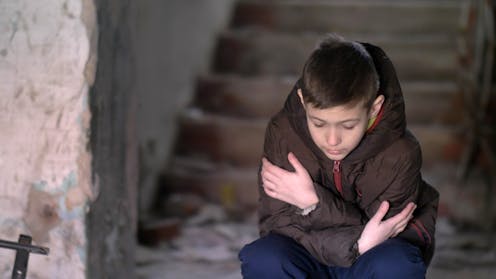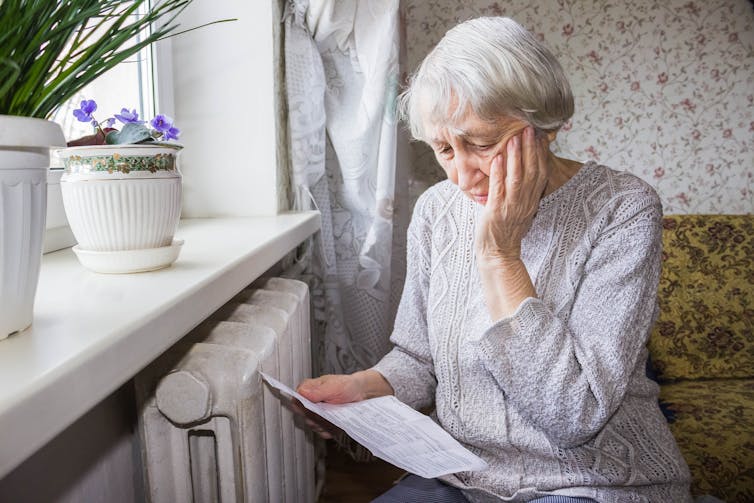
The burden of very high energy prices does not fall evenly across society. The most vulnerable customers are more likely to be on the most expensive tariffs because they’re more likely to pay for their energy via prepayment meters and face barriers to switching, such as limited access to the internet.
One in six of the poorest households have energy bills at least 25% above the average. These include people with unavoidably high energy costs, such as those confined to the home due to poor health or old age, as well as large families and those living in energy-inefficient homes who cannot afford to insulate them or rely on their landlords to do so.
People living in privately rented properties will be hit particularly hard, as this sector of housing contains the greatest number of the least energy efficient properties and the most vulnerable occupants.
My research, conducted with colleagues at the Fuel Poverty Research Network, looked at how vulnerable households cope when faced with significant increases in energy prices. We found that people have ingenious strategies for beating the cold but they come at a cost to their health and wellbeing if they become routine.
Cold food and exercise as a distraction
We interviewed private renting tenants living in fuel poverty. Fuel poverty essentially means an inability to afford to heat the home to a safe and comfortable level. We discovered that it was routine in all of the 50 households we studied to do the following things to reduce energy costs:
spend as much time outside the home as possible (riding public transport, sitting in libraries, staying with family and friends, staying at work longer)
eat food cold out of tins and eat the cheapest, least nutritious food such as white bread and packet noodles
only heat and use one or two rooms in the home using plug-in electric heaters, and turn off radiators in other rooms
only use rooms that get sunshine
get children to do additional exercise to keep them warm and distract them from the cold
use smart meters, where installed, to help ration daily energy use. This leads, in some cases, to cutting back on other essential uses of energy such as lighting.
These strategies can be damaging to health, especially if sustained over long periods. Underheating the home increases the risk of serious illnesses such as heart attacks or strokes, breathing problems, flu and depression. Growing up in a cold home can affect attainment at school and lead to bullying if it makes personal hygiene a luxury.
Not eating enough or eating food with a low nutritional value has multiple health consequences. Cutting back on lighting makes accidents more likely and restricting access to electronic devices used to communicate with others can increase loneliness and isolation.
Our earlier research showed how tenants felt unable to complain to their landlord about the cold for fear of being evicted. Those we interviewed were aware of their weak position as low-income tenants looking for accommodation at a time when housing is in short supply and rents are high.
They also knew that, while an energy efficient home is more desirable, installing cavity wall insulation or double glazing windows might allow the landlord to raise the rent beyond what they could afford.
A paper that myself and colleagues published in 2019 found vulnerable households struggle to get help from energy providers. The people we spoke to lacked the confidence to speak with the firms supplying their energy and felt that when they did, they were pushed towards generic online material rather than offered solutions tailored to their circumstances. Their anxiety was often interpreted by energy company staff as aggression, and conversations were rarely productive.

Since 2019, the number of people living in fuel poverty has doubled. It’s likely to double again by the winter, with 12 million households expected to enter fuel poverty by November 2022.
This is a significant threat to public health which already costs tens of thousands of lives each winter. Combined with the broader cost of living crisis, many millions of households will be relying on unhealthy coping strategies to reduce their energy consumption in the difficult months ahead.
How to get help
If you’re a tenant in the private rented sector struggling to afford to heat your home, help is available which does not entail you having to deal with your landlord or energy provider directly.
Citizens Advice is an independent and impartial advice provider and can help you find the best energy deal available. It can also ensure that you’re receiving all of the income and discounts you’re entitled to. They can liaise with your energy provider to reach agreements about energy debt.
It is illegal to rent out a property with an energy performance certificate lower than an E rating on the A-G scale. Landlords are legally required to spend up to £3,500 on improving the energy performance of their properties.
You can also speak to the environmental health team at your local council. They can assess the dangers posed to you by your home and take action if threats to your health are identified.
Aimee Ambrose has received funding from the Economic and Social Research Council, the Eaga Charitable Trust and the Arts and Humanities Research Council, as well as public sector bodies and charities.
This article was originally published on The Conversation. Read the original article.







